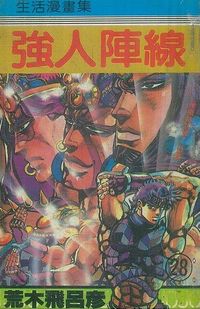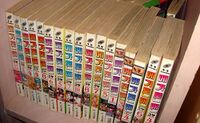Strongman Front Wiki

|
Note: This is a user's personal page attached to their profile! This is not an actual article, may not be related to JoJo or Araki, and is not associated with the wiki. As such, it may not adhere to the policies. |
Strongman Front (強人陣線) is a popular Taiwanese manga series written and illustrated by Feiyan Huang. It was first published in 1977 by Tong Li Comics.
Strongman Front
Parts
- Demon Adventure
- Fighting Tide
- Stardust Expeditionary Force
- Duwang is not Crash
- Boy's Battle Journey
- Summer Colored Miracle
- Blue Tusk Adventures
- Strongmanlion
- The STRONGLands
Protagonists
- Qiaonasen Qiaosida
- Qiaosefu Qiaosida
- Kongtiao Chengtailang
- Dongfang Zhangzhu
- Qiaolunuo Qiaobana
- Kongtiao Xulun
- Qiaoni Qiaosida
- Dongfang Dingzhu
Megaton Man
When JoJo was first brought into Korea, it was illegally distrubted under the name, "Megaton Man." The series was originally published in Super Jump, a Korean bootleg version of Weekly Shonen Jump magazine (not to be confused with the real Super Jump). This bootleg magazine was shortlived, and vanished once the first volume was complete with the rest of the series only being released in tankobon format. The translator is credited as "Park Ryeon," however, the legitimacy of this name remains unknown. Megaton Man covers the first 5 parts of the series, ending its published before the completion of Vento Aureo. Despite being divided into seperate volumes, the contents of these volumes bare no resemblance to the official release. These volumes also have a much higher page count than their Japanese counterparts.
Up until 2013, when the series was first officially released in Korea, Megaton Man had been the most circulated bootleg release of JoJo in existence. This was both due its popularity in Korea, and the fact that the series was printed in much larger quantities than bootlegs in other countries. In Korea, if a book sold in a second-hand or rental store were too low in demand, then the book would be thrown away for taking up space. Conversely, for popular series such as JoJo and Fullmetal Alchemist, which were high in demand, it wasn't uncommon to find respectable stores putting bootlegs copies on the shelves. However, when the series went out of print in the late 2000s, the bootleg faded into obscurity. It was only when the anime came out that Megaton Man saw a resurgence in popularity, with volumes sold today being priced comparable higher than they originally were. Despite just being a crappy bootleg, Megaton Man has gained a large following due to its comedically bad translations (sort of like a Korean version of Duwang). While these poor translations completely ruin the serious tone of the series, their strange nature only serves to exemplify the bizarreness that the series is known for. For this reason, Megaton Man has become a cult classic among Korean JoJo fans, with some even going as to say that it shouldn't be compared to the original.
As a result of the bootleggers likely trying to target a bigger demographic, a lot of dialouge in Megaton Man has been toned down to suit general audiences of the 80s and 90s. All the characters use respectful language when talked to their seniors, and every instance of bad language has been removed or replaced with cleaner alternates. For example, during the scene where Dio curses his father and spits on his grave in Part 1, all the cursing was removed and the spit was whited out. Due the cultural stima toward profanity that existed in Korea at the time, these changes were unavoidable, however, the nature of these changes are strangely inconsistent. Many lines in the original that were normally clean have been replaced with much more profane version in the Megaton Man version. For example, after getting beaten up for trying to save Erina from the bullies teasing her, Jonathan takes out his anger and tells Erina to "go f*ck herself" when she comes to his aid. Aside from that, the use of alcohol and cigarettes are still present despite supposdly being aimed at young children.
Most of the names in Megaton Man have have been alterted--a common practice among bootlegs--which characters often having their names change to some weird pronounciation or something else completly different made up by the translator. Erina Pendleton becomes "Erina Pendlelon," Zeppeli becomes "Perio," Speedwagon becoming "Peace, the Angel of Darkness," Lisa Lisa becomes "Lisa," Polnareff becomes "Paul," and Bruno Buccellati becoming "Sofia Buccellati." Japanese names suffered a much worse fate, with Jotaro Kujo becoming a boy from Hong Kong with the quirky nickname "JoJo-chan." Stands were also intially called Shadows (purse owner reference), but suddenly switched back to being called Stands in Part 4. Even Jotaro's famous "Ora Ora Ora!" was changed to what I can only assume is just screaming in Korean. Some of these dialouge changes in Megaton Man give it a much more homoerotic feel, even more so than the original. Especially for Dio, who is depicted as bisexual in Part 1 long before it alluded to in the original. There's also a suspicion that the translator's favourite character is Polnareff, as a lot of dialouge was changed in his favour.
Just like Duwang, many words and phrases from Megaton Man have been parodied and turned into internet memes online. These colloquialisms include Dio wimpering "You disgusting idiot!" (더러운 바보가~!) from Part 1, Jotaro shouting "Haaargh! I don't know anything anymore!" (히요옷~ 나도 이젠 모른다!"), and Gold Experience being called (literally) a "gold experience" (황금체험) in Part 5.




